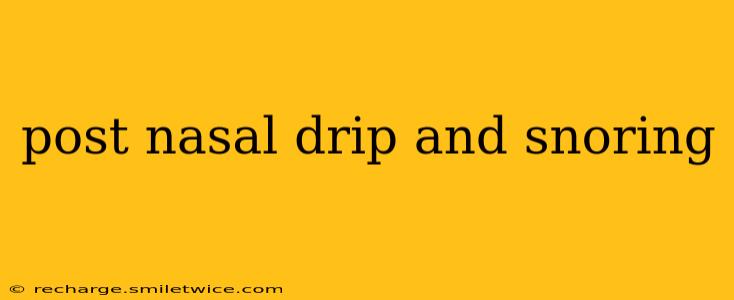Post nasal drip and snoring often go hand-in-hand, creating a frustrating cycle of discomfort and sleep disruption. While not always directly causal, they frequently coexist and exacerbate each other. Understanding the relationship between these two common conditions is crucial for effective treatment and improved quality of life. This comprehensive guide explores the connection, common causes, and effective management strategies.
What is Post Nasal Drip?
Post nasal drip (PND) refers to the excess mucus dripping down the back of your throat from your nasal passages. This mucus can be clear, white, yellow, or even green, depending on the underlying cause. While a small amount of mucus is normal, excessive dripping can lead to a range of unpleasant symptoms, including a scratchy throat, coughing, and the feeling of a lump in your throat.
What is Snoring?
Snoring is the harsh, vibrating sound produced during sleep when airflow is partially obstructed in the upper airway. This obstruction can be caused by various factors, including anatomical issues (like a narrow airway or enlarged tonsils), obesity, alcohol consumption, and even sleeping position.
How are Post Nasal Drip and Snoring Connected?
The connection between post nasal drip and snoring is multifaceted. Excess mucus from PND can irritate the throat and increase the likelihood of airway obstruction, leading to snoring. The increased inflammation in the nasal passages and throat caused by PND can also contribute to the narrowing of the airway, making snoring more likely. Conversely, snoring itself can sometimes worsen PND. The vibrations and pressure changes during snoring can irritate the nasal passages, potentially increasing mucus production.
What causes post nasal drip?
Several factors contribute to post nasal drip. These include:
- Allergies: Allergic rhinitis (hay fever) is a common cause, triggering inflammation and increased mucus production.
- Infections: Viral or bacterial infections in the nose and sinuses can lead to increased mucus.
- Non-allergic rhinitis: This condition causes similar symptoms to allergies but isn't triggered by allergens.
- Irritants: Exposure to dust, smoke, or other airborne irritants can stimulate mucus production.
- Medications: Some medications, such as certain blood pressure drugs, can have PND as a side effect.
- Gastroesophageal reflux disease (GERD): Stomach acid refluxing into the esophagus can irritate the throat and trigger increased mucus production.
What causes snoring?
Snoring is often associated with:
- Obstructive sleep apnea (OSA): A serious sleep disorder where breathing repeatedly stops and starts during sleep. OSA often involves snoring.
- Obesity: Excess weight in the neck and throat area can narrow the airway.
- Alcohol consumption: Alcohol relaxes throat muscles, increasing the likelihood of airway obstruction.
- Sleeping position: Sleeping on your back can worsen snoring.
- Anatomical factors: A deviated septum, enlarged tonsils or adenoids, or a small jaw can contribute to snoring.
Can post nasal drip cause snoring?
Yes, post nasal drip can directly contribute to snoring. The excess mucus can act as a physical obstruction in the airway, making it harder to breathe and leading to vibrations and the characteristic snoring sounds. The inflammation associated with PND can further narrow the airway, exacerbating the issue.
Can snoring cause post nasal drip?
While less direct than the other way around, snoring can potentially worsen PND. The vibrations and pressure changes in the nasal passages during snoring can irritate the nasal lining and increase mucus production.
How is post nasal drip treated?
Treatment for post nasal drip depends on the underlying cause. Options include:
- Saline nasal sprays: Help to rinse away excess mucus.
- Decongestants: Can temporarily relieve congestion but should be used cautiously.
- Antihistamines: Effective for allergy-related PND.
- Corticosteroid nasal sprays: Reduce inflammation.
- Addressing underlying conditions: Treating allergies, infections, or GERD.
How is snoring treated?
Snoring treatment options vary based on the underlying cause and severity:
- Lifestyle changes: Losing weight, avoiding alcohol before bed, and changing sleeping positions.
- Mouthpieces: Oral appliances can help to keep the airway open.
- CPAP therapy: Continuous positive airway pressure therapy is a common treatment for OSA.
- Surgery: In some cases, surgery may be necessary to correct anatomical issues.
Conclusion: Managing Post Nasal Drip and Snoring
Addressing both post nasal drip and snoring often requires a multi-pronged approach. Identifying and treating the underlying causes of PND, such as allergies or infections, is crucial. Similarly, managing snoring might involve lifestyle changes, medical devices, or even surgery depending on the severity and cause. Consulting a doctor or ENT specialist is recommended to receive a proper diagnosis and personalized treatment plan to effectively manage both conditions and improve your sleep quality and overall well-being. They can help determine the root cause of your symptoms and recommend the most appropriate course of action.
